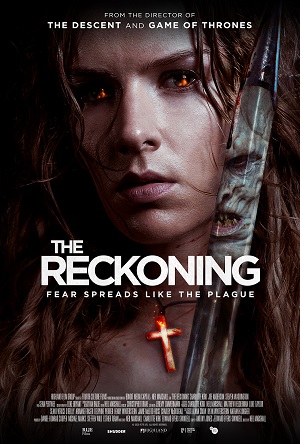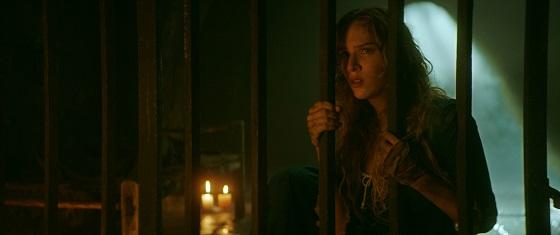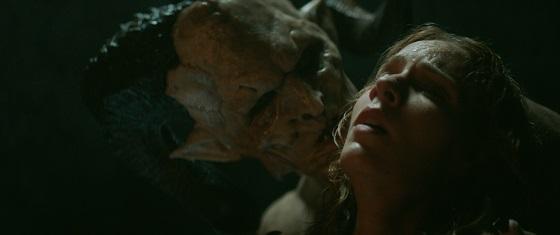

[Rating: Minor Rock Fist Down]
In Theaters, On Demand and Digital February 5, 2021 from RLJE Films and Shudder.
Maybe this is an impossible task; maybe there’s just no way to make an engaging film about a European witch trial. If that was the case, the fact that The Reckoning isn’t very good might be excusable, for the history of it is an ugly, messy business that is inextricably tied to not just the human condition as to relates to fear and notions of a community’s “other,” but to the west’s systematic persecution and oppression of women across multiple centuries. There’s more wrong with the film than just its unpleasant subject matter, though, for its heavy-handed tone, clunky dialogue, and refusal to concede to the realities of basic human physiology weigh down an otherwise distasteful story.
A title card at the top of the film establishes the setting as 1665 England, which is suffering through a terrible plague. It’s not just the fleas on rats infecting people, but a pestilence of fear that has spawned witch mania in the region. Young couple Joseph (Joe Anderson) and Grace (Charlotte Kirk) are scraping by on their farm outside the nearby village when Joseph comes down with a cough and some boils. Rather than risk the health of his wife and baby, Joseph hangs himself, leaving his family at the mercy of the local landlord, Pendleton (Steven Waddington), who has some creative ideas about how the new widow can pay her rent.
When Grace spurns Pendleton’s advances, she’s brought up on trumped up charges of witchcraft, leading to the arrival of famed witch hunter, Moorcroft (Sean Pertwee), who quickly establishes himself as more sadist than jurist. The rest of The Reckoning concerns itself with Charlotte’s torture, prison cell despair, and plans for revenge against her tormentors. Most of the third act hinges on the sympathies of a boy tasked with cleaning the prison holding Charlotte, with just one inconsequential twist near the end to interrupt what’s telegraphed throughout the majority of the picture.

There’s a movie somewhere inside The Reckoning that does more than just go through the motions of a torture trial where the heroine, hair and makeup rarely out of place, suffers as little more than a narrative martyr. This could have been a movie about Grace battling not just Moorcroft, but also notions of mass hysteria, misogyny, or even the validity of torture as an interrogation method. Writer/director Neil Marshall has made layered, nuanced films in the past that effectively juggled genre subversion (The Descent), toxic masculinity deconstruction (Dog Soldiers), and even mass hysteria (Doomsday). None of that thoughtful creativity is on display in The Reckoning, however, which presents everything as explicit and one-dimensional.
Even before her arrest, Grace begins experiencing visions of her dead husband, whose reappearance throughout the film alongside the actual Devil (Ian Whyte) represent a sort of spiritual trial running parallel to her actual one. The fact that her jailers never allow Grace to sleep might have opened the door to a question about whether these visions are real, or just a product of exhaustion. This, in turn, could have spawned an interesting conversation about the nature of true evil, and whether Grace’s visions connect to a spiritual dimension, or just the inhumanity of this time/place.
No such luck, though. Like actual torture, which serves no real purpose except as punishment, the film keeps going back to the increasingly vicious interrogation methods applied to Grace, which culminate in an appalling (though mercifully unseen) sexual assault that should have left the poor woman immobile. Like all the torture in The Reckoning, however, Grace walks away (literally) with her hair and makeup intact, which is important since the film is building towards the eponymous reckoning that will need her up and about. Without moving into spoiler territory, it should suffice to say that the last 20-ish minutes of the film is just as ridiculous as the previous 90, and do little to salvage the overall effort.

Pertwee aside, the acting is mediocre at best, yet seems more a product of the film’s overly serious tone and direction than the performances themselves. Hard close-ups, wild-eyed screeds, and under-brow glances mix together in a ludicrous stew that gives the film an almost parody feel: like the movie is so grave it looped back in on itself to become satire (which it isn’t). The costuming is fun in a period sense (the plague masks look great), yet the overall aesthetic of The Reckoning is a very clean one, with clothes, hair, and skin uniformly clean and polished. Taking the audience even further out of things, the dialogue veers between somewhat period appropriate to 20th century slang, with one character (in 1665!) screaming, “I’m not taking your shit anymore!”So maybe this wasn’t an impossible task, after all. Maybe this is just a lousy movie with stilted/anachronistic dialogue, tonal problems, and tired, worn out themes that audiences are justifiably bored with.
Marshall, who has made a name for himself in recent years as a crackerjack T.V. director for some of Game of Thrones’ best battle-centered episodes, seems to have too much on his plate with The Reckoning, for even the action scenes aren’t especially creative or fun (and the less said about the laughably bad witch pyre VFX the better). Maybe one day he’ll get back to his Dog Soldiers and Descent heights, but if his latest effort is any evidence, the wait might be a long one.





Comments on this entry are closed.